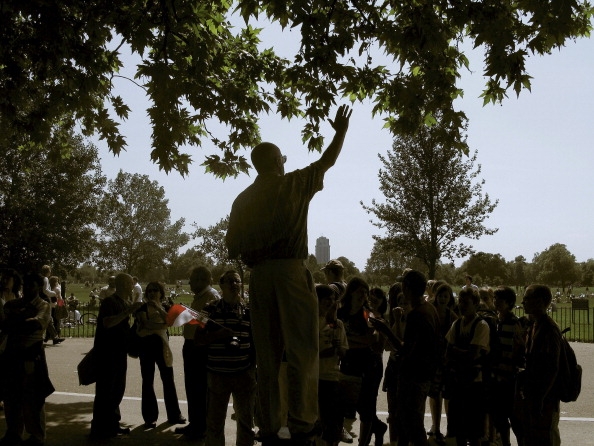You have /5 articles left.
Sign up for a free account or log in.

Hyde Park Speakers’ Corner
Getty Images
In an era of information overload, we face the problem that too much information is equivalent to too little. But we also face a more serious problem: a Gresham’s law of information in which bad information is driving out good information. Gresham’s law also holds for speech and is thus relevant to the many speech-related upheavals occurring on college and university campuses that we’ve read about repeatedly (and, by now, ad nauseam).
What makes the situation particularly challenging is that a worthy and important concern for free speech can overshadow the concern for quality speech. But, given the business that institutions of higher education are in -- that of teaching and learning, scholarship and science -- it would seem entirely fitting and proper for them to have certain standards of speech. To be sure, the way in which we go about our business changes over time; we learn new things and do our work in different ways. But if we simply do not believe in our basic goals and the rules for achieving them, we should consider some other line of work.
The most ultramontane free speech advocates adopt a kind of domino theory according to which recognizing such distinctions can never be principled or even possible. To use a mélange of comparable metaphors, it is the thin edge of the camel’s nose sliding down the slippery slope under the tent. How can you possibly turn Richard Spencer down while accepting Charles Murray? But domino theories should be viewed with suspicion, as they depend on an inability to make reasoned judgments based on principles that can be understood and values that can be shared. To give one example of a problematic and widely unaccepted domino theory: abortion is murder, and women who would terminate a pregnancy are on a slippery slope to drowning their toddlers in a bathtub.
And then there is the metaphor of a “marketplace of ideas.” But is that the most appropriate way to think about colleges and universities? Presumably, in a marketplace, you get to sell whatever someone else wants to buy. Order comes from a phantom yet efficacious metaphorical body part: the invisible hand. In a college or university, however, order presumably comes from the interaction of various segments of a community: faculty members, administrators, staff members, board members -- and, yes, students as well. Not that such order is always easily achieved.
There may be a place on a campus that functions like that marketplace of ideas, a kind of Hyde Park Speakers’ Corner. The most familiar example is Sproul Plaza on the Berkeley campus of the University of California -- a site with a lively and storied past. But as we have seen, outside parties with private funding who clearly do not have the interest of the university at heart can exploit such supposedly free market spaces. Dealing with such situations presents its own challenges to those responsible for the institutions, challenges that Berkeley in particular has dealt with quite well.
So, what is a different way of thinking about significant speech events on campuses?
First of all, we might replace the metaphor of the market with the metaphor -- or more than a metaphor -- of representative democracy. Representatives of different sectors of the community might come together to commune and prioritize. They might agree that diversity of viewpoint is a major desideratum. They might also consider that the term “conservative” is thrown around promiscuously these days and that it might be good for students to learn what it actually means when taken seriously.
Thought might also be given to event formats. Would it be especially desirable to have two speakers at once, representing different views, for at least some events? Might it be desirable to require a question-and-answer session?
Different segments of an academic community have their respective roles to play as they come together to consider the goals and standards for campus speech. Faculty members, who are the ones getting paid -- as opposed to students, who are the ones paying -- might remember that theirs is the role of relative grown-ups, especially in institutions populated by traditional college-age students. They are the ones who can themselves set a standard as speakers, through a regular respect for facts, reason and rhetorical skills. They cannot play such a role if they are given to online trolling, for example -- or if they fail to take seriously their responsibilities as teachers.
Students, for their part, should see the responsibilities they themselves take on as preparation for life after college -- their working life, their life as citizens in a democracy and a life of using their college years as a springboard for continuing to learn.
Administrators generally share the grown-up role with faculty members, and the more the two coordinate their efforts, the better. Senior administrators -- presidents in particular -- have a special role. The president is not simply a chief executive officer but also a chief interpretive officer, the one who must comment effectively and powerfully. It can be a challenge for the institutional leader to avoid innocuous, pablum-like utterances while taking the high road -- particularly since true and relevant statements morph into clichés all too quickly (e.g., “This does not reflect the values of X college”). But presumably, that is why presidents are paid those big bucks. Perhaps they can get help from the humanists and communications specialists on their faculty.
And perhaps institutions of higher education can contribute as much as possible to the kind of quality speech we all need more of in these times.








